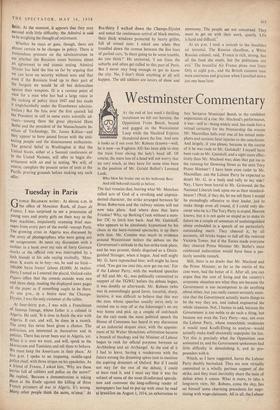Tuesday in Paris
GEORGE B1LAINKIN writes : At eleven a.m. in the office of Monsieur Rank, of Jours de France, I was surprised to see a procession of Young men and pretty girls on their way to the tape machines, impatiently scanning brief mes- sages from every part of the world—except Paris. The growing crisis in Algeria was discussed by the army of photographers who were going out on assignments. At noon my discussion with a cashier in a bank over my sale of forty German marks at the official rate was interrupted by a lush blonde at his side saying excitedly, 'Mon- sieur X wants us to buy—no, he said no limit- 100,000 Swiss francs' (about £8,000). At twelve- thirty I noted as I entered the placid, Oxford-calm Figaro office that the crowds outside were two and three deep, reading the displayed mews pages of the paper as if something ought to be there. At one p.m., in a bistro near the Champs- Elysdes, I was the only customer at the tables.
At four-thirty p.m., I was with a Frenchman of famous lineage, whose father is a colonel in Algeria. He said, 'It is time to finish the war with Algeria. It can, and will, be done in a month. The army has never been given a chance. The Politicians are interested in themselves and in Politics. There has never been war in Algeria, yet. When it is over we must, and will, speak to the Moroccans and Tunisians and tell them to behave. We must keep the Americans in their place.' At five p.m. I spoke to an imposing, middle-aged police chief, with three stripes on his epaulettes. As a friend of France, I asked him, 'Why are these lorries full of soldiers and police on the move?' He replied, 'Because a demonstration is taking Place at the Etoile against the killing of three French prisoners of war in Algeria. It's wrong. Many other people think the same, m'sieur.' At five-thirty I walked down the Champs-Elysdes and noted the continuous arrival of black marias, their thick windows protected by heavy grilles, full of armed men. I asked one when they trundled down the avenue between the five lines of parked cars, 'Is there going to be some trouble, do you think?' He answered, 'I am from the suburbs and often get called to this part of Paris. But I never stay long enough to get to know the city. No, I don't think anything at all will happen. The old soldiers are lovers of show and ceremony. The people are not concerned. They want to get on with their work, quietly. Life is hard and difficult.'
At six p.m. I took a taxicab to the Invalides air terminal. The Russian chauffeur, a White Russian colonel, said, 'France is rich, strong, has all the food she needs, but the politicians are evil.' The beautiful Air France plane rose from Orly at eight p.m., and the British customs men were courteous and gracious when I touched down just one hour later.


































 Previous page
Previous page